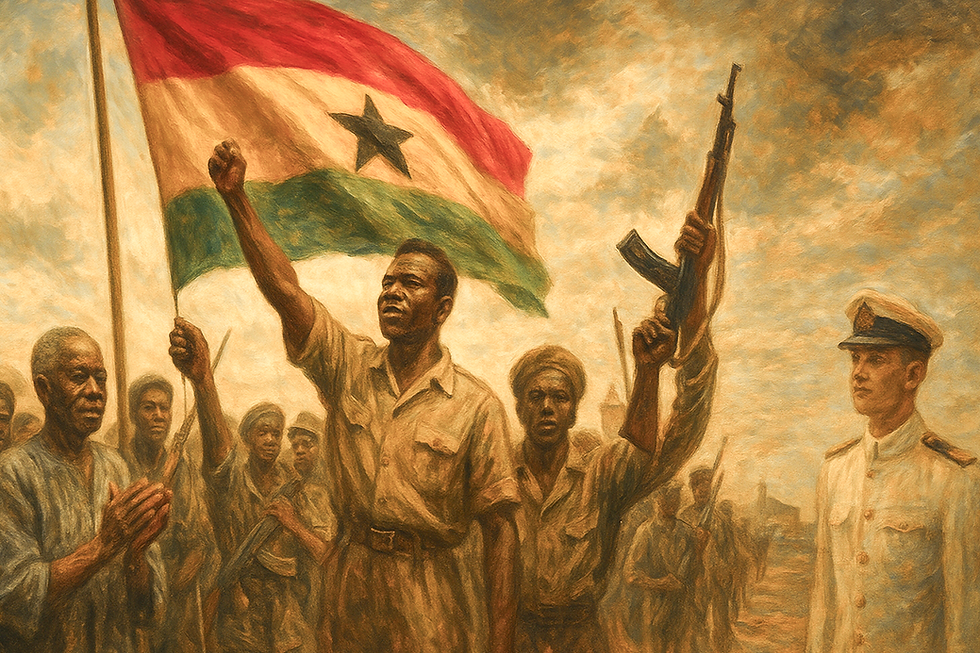The Caribbean and Decolonization Through Culture
- Cătălina Ciobanu
- Sep 16, 2025
- 4 min read

When we think of decolonization, we often picture wars of liberation, nationalist revolutions, and the dramatic fall of empires. In the Caribbean, however, the story of decolonization unfolded differently. Political independence came gradually, through negotiation and constitutional change, but the true engine of liberation was culture. Music, literature, festivals, and diasporic movements gave voice to Caribbean identity and challenged the colonial mindset long before formal independence was achieved.
From reggae in Jamaica to calypso in Trinidad, from the novels of Derek Walcott to the poetry of Aimé Césaire, Caribbean culture became a powerful tool of resistance and self-definition. This article explores how the Caribbean decolonized itself not only through politics but also through its vibrant cultural life, and how this legacy continues to shape the region today.
Colonial Background
The Caribbean was one of the first regions to be colonized in the age of exploration and one of the last to achieve widespread independence. Colonized by Spain, Britain, France, and the Netherlands, the islands became central to the Atlantic slave trade and plantation economies. Sugar, rum, and coffee fueled European wealth, while enslaved Africans endured unimaginable suffering.
Even after the abolition of slavery in the 19th century, the Caribbean remained economically dependent and politically tied to Europe. By the early 20th century, most islands were still colonies or protectorates, with little local control. Yet cultural creativity, rooted in African, European, and indigenous traditions, was already laying the groundwork for resistance.
Nationalism and Political Decolonization
Formal political decolonization in the Caribbean began in the mid-20th century. Britain, France, and the Netherlands gradually granted independence or autonomy to their colonies:
Jamaica and Trinidad and Tobago became independent in 1962.
Barbados followed in 1966, with many others in the 1970s.
Some territories, like Puerto Rico, remained in unique relationships with their former rulers.
The French Caribbean islands (Martinique, Guadeloupe, French Guiana) became overseas departments of France, maintaining close ties but also tensions over identity.
The Caribbean Federation (1958–1962) was an ambitious attempt at regional unity, but it collapsed quickly. Political independence was often fragile, but what united the Caribbean across linguistic and national lines was culture.
Music as Decolonization
Music became the most powerful expression of Caribbean identity.
Calypso in Trinidad used humor, satire, and rhythm to critique colonial authorities and celebrate local life. Songs became a form of political commentary, giving ordinary people a voice.
Reggae, emerging in Jamaica in the 1960s, went global with artists like Bob Marley, whose music carried themes of liberation, Rastafarian spirituality, and anti-imperialism. Reggae became the soundtrack of decolonization not only in the Caribbean but worldwide.
Other genres like ska, soca, and dancehall reflected the diversity and dynamism of the region.
Music was more than entertainment; it was resistance, storytelling, and identity-building.
Literature and the Caribbean Voice
Caribbean writers played a key role in decolonization by redefining language and history.
Aimé Césaire, from Martinique, was a founder of the Négritude movement, which celebrated African heritage and condemned colonial racism. His poetry and politics inspired generations.
Derek Walcott, Nobel Prize-winning poet from Saint Lucia, used epic verse to explore the Caribbean’s hybrid identity, blending classical forms with local experience.
V.S. Naipaul, from Trinidad, wrote novels that reflected the tensions of postcolonial societies, grappling with identity, exile, and belonging.
Through literature, the Caribbean claimed the right to narrate its own story, no longer filtered through colonial voices.
Festivals and Rituals of Freedom
Carnival, Junkanoo, and other Caribbean festivals embodied cultural decolonization. Rooted in African traditions and reshaped under colonialism, these celebrations became powerful affirmations of identity.
Carnival, particularly in Trinidad, used costumes, masquerades, and music to invert colonial hierarchies. Slaves once mocked their masters through masquerade; today, Carnival is a global symbol of Caribbean creativity and resistance.
Rastafarianism, blending spirituality, Afrocentric pride, and resistance to Babylon (colonial oppression), turned religion itself into a tool of liberation.
Festivals made decolonization visible in the streets, with music, dance, and performance transforming colonial spaces into stages of freedom.
Diaspora and Global Influence
Caribbean decolonization cannot be understood without the diaspora. Migration to Britain, Canada, and the United States spread Caribbean culture globally. The Windrush Generation of Caribbean migrants to Britain after World War II not only rebuilt postwar Britain but also transformed its culture through music, food, and activism.
The global success of reggae, calypso, and Caribbean literature amplified the region’s voice. Diaspora communities challenged racism in their host countries while affirming Caribbean pride. In this way, cultural decolonization was not confined to the islands but became part of a worldwide movement.
Challenges and Legacies
Despite vibrant cultural expression, the Caribbean faced challenges after independence. Small economies remained dependent on tourism and exports. Political instability and Cold War interventions, such as the U.S. invasion of Grenada in 1983, revealed ongoing vulnerability.
Yet culturally, the Caribbean succeeded where politics struggled. Its music, literature, and festivals created a shared sense of identity that transcended borders. They provided tools to resist neocolonialism and gave the region global influence disproportionate to its size.
Decolonization Beyond Politics
In the Caribbean, decolonization was not just a matter of flags and constitutions. It was a cultural revolution, fought through song, poetry, carnival, and diaspora. The Caribbean showed the world that liberation can be achieved through creativity as much as through politics.
Today, Caribbean culture continues to inspire global movements for justice, equality, and pride. From reggae concerts to Carnival parades, the region’s cultural heritage reminds us that the struggle against colonialism was not only about ending foreign rule but also about reclaiming the power to define identity and destiny.




Comments